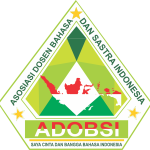Aspek Kehidupan Sosial dalam Drama Korupsi Karya Norbertus Riantiarno: Kajian Sosiologi Sastra
Abstract
The purpose of this research is to find the influence of the author's social background and identify the aspects of social life reflected in the drama Korupsi by Norbertus Riantiarno. Descriptive qualitative is the type of research used in this study. The data source used in this research is the drama Korupsi by Norbertus Riantiarno which was uploaded through the YouTube channel of Teater Koma in 2021. The drama Korupsi has a duration of 39 minutes 54 seconds. The data in this study is information (words, phrases, clauses or sentences) related to aspects of social life in the drama Korupsi by Norbertus Riantiarno which is the source of research data. The results of the research can be concluded that the content of N. Riantiarno's works, especially plays, has political reflections in it that represent various political interests. N. Riantiarno said that he wanted to create a political-social mirror. In addition, there are seven social aspects reflected in the drama Korupsi, namely: 1) concern about the persistence of corruption, 2) corruption is the cause of the country's destruction, 3) officials corrupt to live in luxury, 4) regional leaders with poor performance, 5) religion used as political material, 6) special taxes for the rich, and 7) human lifestyle that causes disease to come.
Keywords
Full Text:
PDFReferences
Ardiansyah, Nensilianti, & Tuflih, M. A. (2021). Perseteruan monarki dalam naskah drama La Tinro karya Rostan Yuniardi (Kajian sosiologi sastra Ian Watt). Neologia, 2(3), 164–172. DOI: https://doi.org/10.59562/neologia.v2i3.32339
H.S., A. K. (2013). Kajian sosiologi sastra, nilai pendidikan, dan resepsi sastra naskah drama Opera Kecoa Karya N. Riantiarno [Universitas Sebelas Maret]. https://digilib.uns.ac.id/dokumen/detail/33554/Kajian-Sosiologi-Sastra-Nilai-Pendidikan-Dan-Resepsi-Sastra-Naskah-Drama-Opera-Kecoa-Karya-N-Riantiarno
Hwia, G. (2014). N. Riantiarno, teater Koma, dan Refleksi Politik dalam Karya Sastra. Jentera, 3(1), 10–22. DOI: https://doi.org/10.26499/jentera.v3i1.424
Kemdikbud (2016). N. Riantiarno (1949-…). Ensiklopedia sastra Indonesia. Badan Pengembangan dan Pembinaan Bahasa Kementerian Pendidikan, Kebudayaan, Riset, dan Teknologi Republik Indonesia. https://ensiklopedia.kemdikbud.go.id/sastra/artikel/N_Riantiarno
Oktaviani, D., Ginting, B., Gusty, N., & Yulisetiani, S. (2022). Menilik isu mental illness pada generasi milenial dalam novel 00 . 00 : Sebuah kajian sosiologi sastra Ian Watt. 11, 27–44. DOI: https://doi.org/10.24114/kjb.v11i3.38815
Pranoto, Naning. 1986. ”Riantiarno: Masyarakat adalah Ibu Saya”. Dalam Suara Karya, Minggu, 30 November 1986..
Putri, A. S., & Parmin. (2022). Aspek kehidupan sosial dalam film pendek Nyengkuyung karya Wahyu Agung Prasetyo : Kajian sosiologi sastra Ian Watt. Sapala, 9(1), 53–62.
Ramadhani, A., Putri, N. Q. H., & Agustian, J. F. (2018). Analisis Implikasi Sosial Dalam Cerpen Solusi Terbaik Adalah Masuk Sekolah Karya Mawar Sari (Pendekatan Sosiologi Sastra Ian Watt). Adjektiva: Educational Languages and Literature Studies, 1(2), 35–43. DOI: https://doi.org/10.30872/adjektiva.v1i2.1399
Safitri, M. W., Hasanudin, C., & Sutrimah. (2022). Analisis sosiologi sastra dalam novel Segi Tiga karya Sapardi Djoko Damono hubungannya dengan pembelajaran bahasa Indonesia di SMA Milanda. Prosiding Senada PBSI. 2(1), 1080–1096.
Sangidu. (2004). Penelitian sastra, pendekatan teori sastra, metode, teknik, kiat. Unit Yogyakarta: Penerbitan Sastra Barat UGM.
Satoto, S. (2012). Analisis drama & teater. Yogyakarta: Penerbit Ombak.
Sulistiyana, P. (2013). Representasi kemiskinan dalam Novel Jatisaba karya Ramayda Akmal. Journal of Chemical Information and Modeling, 53(9), 1689–1699.
Suraya, J. (2022). Refleksi kehidupan masyarakat Minangkabau pada tahun 1920-an dalam novel Salah Asuhan ( 1928 ) karya Abdoel Moeis : Kajian sosiologi sastra Ian Watt. Nuansa Indonesia, 24(2), 204–215. DOI: https://doi.org/10.20961/ni.v24i2.71396
Suryana. (2012). Metodologi Penelitian: Metodologi Penelitian Model Prakatis Penelitian Kuantitatif dan Kualitatif. Universitas Pendidikan Indonesia, 1–243. https://doi.org/10.1007/s13398-014-0173-7.2
Sya’baan, A. M. R., & Tike, L. (2022). Masalah-masalah sosial dalam novel Negeri Para Bedebah dan Negeri di Ujung Tanduk karya Tere Liye sosiologi sastra Ian Watt. Jurnal Bastra (Bahasa dan Sastra), 7(3), 523-531. DOI: https://doi.org/10.36709/bastra.v7i3.86
Yusuf, M. Y. (2015). Sastra dan difabel : Menilik citra difabel dalam novel Biola Ta Berdawai dari sudut pandang sosiologi sastra Ian Watt. Inklusi, 2(1), 21–40. DOI: https://doi.org/10.14421/ijds.020102
Refbacks
- There are currently no refbacks.






